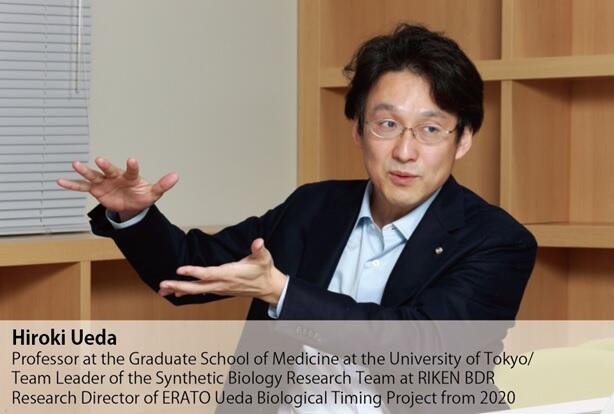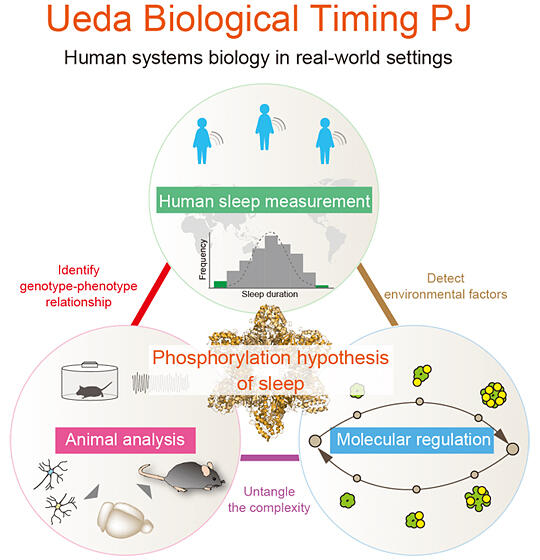Interest in sleep research has increased in recent years. The ERATO 'Ueda Biological Timing Project,' launched in October 2020, involves three sleep-research groups as well as the 'Children Sleep Checkup Project,' which analyzes and proposes guidelines for healthy sleep in children. JST News interviewed four individuals about the current state and future prospects of sleep research: Professor Hiroki Ueda of the Graduate School of Medicine at the University of Tokyo, who oversees the research (Research Director of the Project), Visiting Researcher Rikuhiro Yamada at the RIKEN Center for Biosystems Dynamics Research (RIKEN BDR), and Lecturer Koji L. Ode and Project Lecturer Akifumi Kishi of the Graduate School of Medicine at the University of Tokyo.
Clarifying biological time from molecules to individuals: Establishment of an academic foundation for future generations

The ERATO 'Ueda Biological Timing Project' approaches sleep from the perspective of 'systems biology that contributes to the understanding of humans' and aims to uncover 'biological time,' which comprehensively covers human sleep and wakefulness from the molecular level to that of individual humans living in society. Professor Hiroki Ueda of the Department of Systems Pharmacology in the Graduate School of Medicine at the University of Tokyo oversees the research as a Research Director. Ueda initiated research on circadian rhythms, including the biological clock, around the year 2000. His work revealed that protein phosphorylation plays an important role in the 24-hour cycle of built-in biological (circadian) clocks and in the temperature compensation mechanism.
Having found that the biological clock ticks with the phosphorylation modification of proteins, around 2010, he began to consider the possibility of that this concept may be further generalizable. Following this, he embarked on research regarding the application of this technology to the realms of sleep and wakefulness, which control the body's behavior. After developing technologies to create genetically modified mice without crossbreeding and analyze all cells in brains that have been made transparent, he began research on human sleep based on these results around 2015.
Subsequently, in 2020, the ERATO Project was launched (see Figure). When he proposed a 'Sleep health checkup' for adults, it elicited a significant response, both from within and outside the field. In 2022, with the cooperation of the Japan Society of Sleep Research and other groups, a nonpartisan 'Diet Members' Caucus to Promote High-Quality Sleep for the Nation (Diet Members' Caucus for Sleep)' was established within the Diet in the same year. Currently, approximately 30 Diet members gather to discuss various systems and issues related to the sleep health checkup.
Figure: ERATO Ueda Project Management Structure

One of the major pillars of the Ueda Project is the 'Children Sleep Checkup Project.' In Japan, not only adults, but also children suffer from insufficient sleep. The Project has been introduced in the media, and an increasing number of schools and municipalities have expressed interest in participating in it. Globally, no large-scale data quantifying children's sleep are available. Ueda has stated, "Sleep in growing children is an important topic globally. We aim to leverage the significant opportunity presented by ERATO to establish an academic research foundation that can be passed on to future generations."
Solid structure with three groups — Extensive international collaboration with the UK
Intellectual input from different fields is essential for promoting the ERATO Ueda Project. Consequently, Ueda has appointed three experts, each specialized in their respective field, and with whom he also has a personal connection, as Group Leaders of the Molecular Control, Animal Analysis, and Human Sleep Measurement Groups. Additionally, Project Associate Professor Yoichi Minami of the Graduate School of Medicine at the University of Tokyo joined the Project as Chief Research Promoter, creating a solid management structure.
Currently, Ueda is also affiliated with the University of Oxford in the UK. The UK has a strong epidemiology research focus, and an outstanding biological data bank project known as the 'UK Biobank' has been established. The University of Oxford, which has pioneered numerous studies using the UK Biobank, attracts researchers from various fields, including statisticians, genetic statisticians, and hospital staff. Ueda is engaged in a wide range of international collaborations with these researchers, while simultaneously focusing on increasing awareness of the ERATO Ueda Project.
Although the Project's main centers are in geographically distant locations—Tokyo and Osaka—communication within the Project operates smoothly through weekly online meetings. "The absence of barriers might be a unique feature of this Project," Ueda has noted. In this special issue, we reveal the results of their sleep research to date as well as its future prospects.
(Article: Naoko Yoshimoto, Photography: Hifumi Miyazawa)




